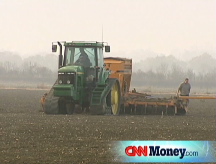Don't get steamed over stores' rice limits
Industry insiders say there's plenty of supply in the U.S. and consumers shouldn't worry about a shortage.
NEW YORK (CNNMoney.com) -- Although warehouse retailers are limiting specialty rice sales, industry experts say U.S. consumers shouldn't worry that there's a shortage in the making.
On the contrary, production of U.S. rice - which makes up the lion's share of domestic consumption - is expected to increase between 3% to 5% this year to about 198 million hundred-weight (hundredweight is a unit of measure equaling to 100 pounds).
That's a sizeable improvement over last year's mostly stagnant growth, according to Steve Martin, an agricultural economist with the Delta Research and Extension Center at Stoneville, Miss.
Martin said he was "puzzled" by media reports that said both Costco (COST, Fortune 500), the No. 1 wholesale club operator, and rival Sam's Club, a division of Wal-Mart (WMT, Fortune 500), were restricting how many bags of rice people could buy.
Sam's Club said Wednesday it was following the lead of other retailers in limiting customers to four 20-pound bags of "imported jasmine, basmati and long grain white rice." The store said there were no restrictions on smaller-size packages, on sales at Wal-Mart stores, or in New Mexico and Idaho.
Costco could not be reached for comment.
Martin and other experts said basmati and other varieties whose sale is restricted represented "specialty" rice, and not the mass-market rice that's primarily consumed in the United States.
"The mass-market variety is the long, medium and short-grain brands like Uncle Ben's that's produced here in the U.S.," Martin said, adding that there's no expected shortage in those varieties.
David Coia, spokesman for the U.S.A. Rice Federation, a trade group that represents the domestic rice industry, offered a similar assessment.
"There is no supply crunch for rice in the United States," Coia said. According to Coia, domestically produced rice makes up 88% of the U.S. market. And that's only half the crop - the other half is exported.
"The bottom line is that there is plenty of rice in the U.S. and there's no need to panic," Coia said.
So then why did these retailers place these restrictions?
Martin speculated that the move is tied to global concerns, specifically recent actions taken by major producers such as India to ban some rice exports.
India is the second-largest rice producer after Thailand, and one of the leading producers of the aromatic basmati rice variety.
In early April, the Indian government announced a ban on exports of low-grade, non-basmati rice that's essentially produced for domestic consumption, in an effort to control a surge in local food prices amid tightening supplies.
"There's no shortage of rice in India, but our buffer stock of rice has fallen. This means we could be going into the danger zone," said Dr. Amit Mitra, secretary general of the Federation of Indian Chambers of Commerce & Industry (FICCI).
What's more, Mitra said this was happening at a time when global commodity prices for grains had "shot through the roof."
"So India would be reluctant to import rice to supplement its buffer stock because of the high global prices," he said.
At the same time, Mitra said the forecast for this year's rice production in India was good, tied to what is expected to be a robust monsoon season in the country. He said the Indian government had not banned basmati rice exports.
Still, he suspects that U.S. retailers were probably concerned that because of the general rise in rice prices, "these retailers' ability to get imported rice at cheap prices will be constrained."
Dr. Robert Zeigler, director of the International Rice Research Institute, a leading rice research center based in the Philippines, told CNNMoney.com that emerging markets such as India, Thailand, Vietnam and China - all major rice producers - have seen sharp surges in consumption driven by economic growth and changes in food consumption patterns.
"But at the same time, these countries haven't really invested in the infrastructure and R&D, and that's led to plateauing of [rice] production growth," Zeigler said.
"There is a downtick in global rice supply and this could be making these retailers nervous," he said. "The bigger challenge is the global food price inflation."
Meanwhile, makers of some popular U.S. rice brands said they aren't concerned about a supply-demand imbalance in the United States.
"We are not worried about supply," Bastiaan de Zeeuw, CEO of Riviana Foods Inc. wrote in an e-mail to CNNMoney.com. The company is the U.S. rice subsidiary of the Spanish firm Ebro Puleva; its brands include Minute and Carolina Rice.
"We believe the action taken by Costco and Sam's [Club] is the result of much higher purchases as people are anticipating substantial additional price increases," he said. "You will note that Wal-Mart has not taken the same measures so far in its stores."
Issue #1 - America's Money: All this week at noon ET, CNN explains how the weakening economy affects you. Full coverage.
Under the government's economic stimulus plan, 130 million people will receive tax rebate checks for $300 and up, starting April 28. What do you plan to do with your check? How do you think the stimulus plan will affect the economy? Send us your photos and videos, or email us and tell us what you think. ![]()



